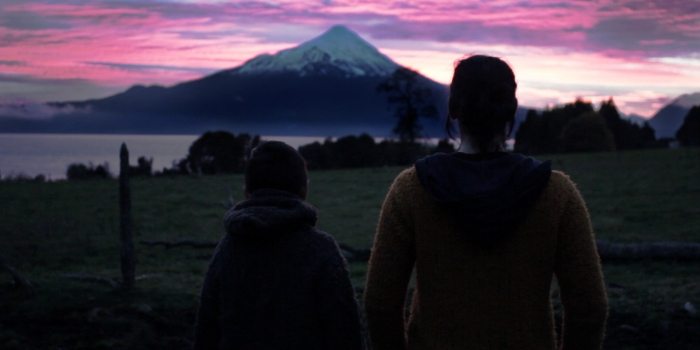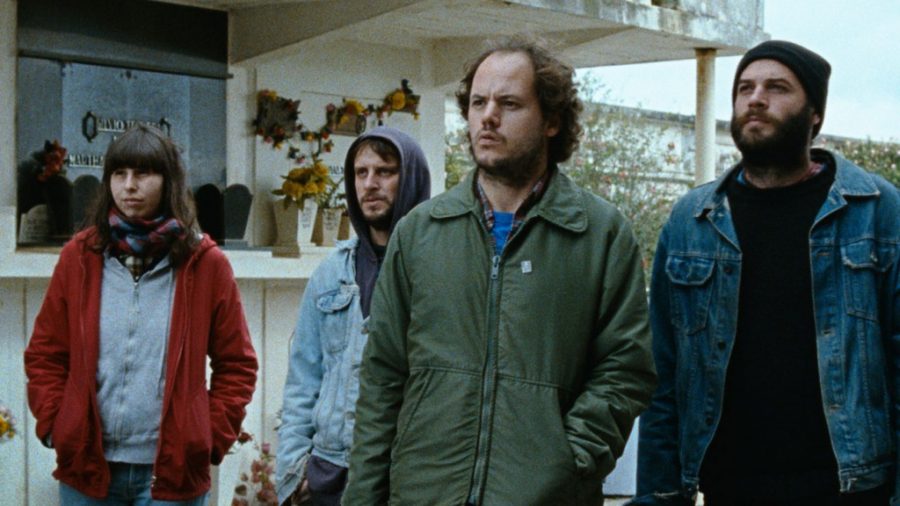
 In Root, Matias Rojas Valencia takes an unlikely pair of characters and sends them on a search for belonging, family and peace using the ever- grey sky, and the misty, luscious rainforests of southern Chile as a backdrop. The striking Mercedes Mujica gives a moving, yet subtle performance as Amalia, a young adult who has returned from her life in Santiago to attend the funeral of the families caretaker, Marina. Things get complicated when Marina’s nine-year-old son Cristobal is left alone, orphaned, and is threatened to become a casualty of the Chilean system.
In Root, Matias Rojas Valencia takes an unlikely pair of characters and sends them on a search for belonging, family and peace using the ever- grey sky, and the misty, luscious rainforests of southern Chile as a backdrop. The striking Mercedes Mujica gives a moving, yet subtle performance as Amalia, a young adult who has returned from her life in Santiago to attend the funeral of the families caretaker, Marina. Things get complicated when Marina’s nine-year-old son Cristobal is left alone, orphaned, and is threatened to become a casualty of the Chilean system.
Amalia, who we learn has also suffered a traumatic childhood, is the sole caring person in the household. She doesn't want Cristobal to suffer the same way she did, so she takes Cristobal on a trip to try and locate his father. Using a beaten up pickup truck as both the literal and figurative vehicle of self and country, Valencia uses the truck as a glaring symbol of the decrepit father-ships that saturate the film. In the search, both Amalia and Cristobal discover something inside themselves, and use this to look towards a brighter future, together, despite their turbulent pasts.
 In The Militant, Manuel Nieto takes unlikely protagonist Ariel Cruz (Felipe Dieste) - an awkward, average looking, somewhat disabled twenty-five year old - and puts him through a series of tests, all simply for the sake of the struggle. After the death of his father, Ariel a university student protest leader ventures away from the Uruguayan capital Montevideo where he has been living, back to the city of Salto to attend his father’s funeral, and settle the estate. He arrives to find a slew of troubling issues that his has father left unresolved- huge debts, a live-in mistress, idle property and a gang of unruly employees.
In The Militant, Manuel Nieto takes unlikely protagonist Ariel Cruz (Felipe Dieste) - an awkward, average looking, somewhat disabled twenty-five year old - and puts him through a series of tests, all simply for the sake of the struggle. After the death of his father, Ariel a university student protest leader ventures away from the Uruguayan capital Montevideo where he has been living, back to the city of Salto to attend his father’s funeral, and settle the estate. He arrives to find a slew of troubling issues that his has father left unresolved- huge debts, a live-in mistress, idle property and a gang of unruly employees.
Having left the Montevideo life and comrades behind, the film takes the audience to the countryside of Uruguay. Ariel needs attend to the remains of the family cattle ranch, and this includes the boisterous ranch hands that don’t like this quiet city kid encroaching on their turf. Footage of this part of Uruguay is rarely seen, so just by giving copious footage of the Uruguayan countryside, Nieto makes this whole sequence work excellently. The actors portraying the ranchers do an excellent job of portraying authenticity. When Nieto inserts the city-spent Ariel who is more attuned to fighting for social justice than ranching cattle, the tension rises.
Our hero performs rather averagely, although from the honest perspective we are given we see that Ariel takes on all challenging situations, sometimes succeeding, often failing. At one points Ariel suffers the end of a red-hot branding iron. But one thing is certain: he is no coward. Watching Ariel fumble through Nieto’s processes, Felipe Dieste is fully engaging and carries the film, the only slightly disappointing feature was the lack of any real climax or epiphany for Ariel, who we want to see succeed. Still, this portrayal without the textbook story arc, details an unglamorous side of life, contrasted with a locale that is exotic in its unexpectedness. The result is worth the watch.